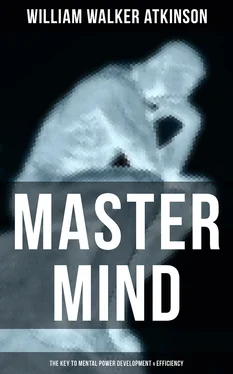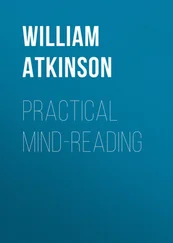Let us begin with your sensations, or report of your senses. You are constantly receiving reports of one or more of your five senses, viz., the respective senses of touch, taste, smell, sight, and hearing. All these reports are in the form and nature of impressions received from the outside world. All that we know of the outside world is made known to us by means of these impressions received through the senses.
A writer has said: "The senses are the means by which the mind obtains its knowledge of the outside world. Shut out from all direct communication with the outer world, it knows, and can know, nothing of what exists or is passing there, except what comes to it through the senses. Its knowledge of what is external to itself is therefore dependent upon the number, state and condition of the sensory organs." But, important as are the five senses and their mechanism, we need but a little thought to convince us that we do not find here the essential fact and power of mind, but rather merely incidental and subordinate powers. We can easily prove this to ourselves in many ways. For instance, we may shut out or shut off the channel of communication of any or all of the channels of the senses, and still be conscious of our own mental existence. Or, we may use the will, through the power of attention, and thus determine which of the many sets of sense impressions seeking admission to our consciousness we shall really receive and entertain in consciousness. We may thus choose between many sounds, or many sights, and deliberately shut out the others. If the sense impressions were the Masters, we could not do this; and so long as we are able to do this, we must look for the Master higher up in the scale.
Moreover, in all of our experience with these sense impressions, we never lose sight of the fact that they are but incidental facts of our mental existence, and that there is a Something Within which is really the Subject of these sense reports—a Something to which these reports are presented, and which receives them. In short, there is always the Something which knows or experiences these sensations. We recognize and express this fact when we say "I feel; I see; I hear," etc. There is always the thing- sensed, then the process of sensing, and finally the Something which experiences the sensation. This Something we speak of as "I." The "I" is always the subject which experiences the sense reports—the Something to whom the messages are presented. And as this Something is capable of either accepting or rejecting, or selecting and controlling, these messages or reports, then the latter cannot be regarded as the Mind Master.
In the same way, we next proceed to the consideration of the Emotional phases of our mentality. In this great realm of the mind we may, at least for the purposes of the present inquiry, include all those mental experiences that come under the respective head of "feelings," "passions," "desires," etc. These seem a little closer to us than did the sensations. This because the sensations came from outside of ourselves, while the emotions and feelings seem to come from within a part of ourselves. The emotional part of our nature is very powerful, so powerful, indeed, that it often seems to rule the entire being of the individual. But a little careful examination will convince us that we may, by the use of the will, not only refuse to obey our emotional urges and demands, but may even destroy them, or replace them with others.
If our emotions were really Masters, we would be bound to act upon them at all times, and upon all occasions, for there would be nothing in us to say Nay! to them. But no one outside of the most primitive and elemental individuals would permit any such rule on the part of the emotional nature, even the less advanced of the race are able to at least partially control and manage the emotional part of their mental nature; and the advanced individuals have acquired the power of frequently deliberately setting aside the dictates of the emotions, and of asserting the power of control over them. So, here too, we see that the Master must be looked for higher up in the scale.
As in the case of the sensations, here too, in the case of the emotions we discover the presence of that Something Within which is the Subject of the emotions—the Something to which the emotions report, and from whom they demand action. Here again we find this "I" occupying a higher seat, and having the reports and demands of the subordinate faculties made upon it. And, mark you this, that in spite of the constant change in the emotional stream of feeling, this "I" always remains the same. Just as in the case of the sensations, the "I" occupies the position of a spectator to whom are presented the sense experiences, so in the case of the emotions the "I" occupies the position of the Something which experiences the ever changing "feeling" of the emotional nature. In both cases there seems to be this constant Something, past which flows the respective streams of Sensations and Emotions. And this Something also has the power to direct and change the course of these streams, if it will but exert its Will Power.
Next we consider the great realm of Thought. Here, too, we find a constant stream of thoughts flowing past the Something—the "I"—which is practically the spectator of the flowing stream; and which also has the power of directing and controlling the stream. While it is true that the individuals of primitive natures are almost passive spectators of the streams of their thoughts, and exercise little or no control over them, it is an unquestioned fact that other individuals who have cultivated their Will Power are able to turn their attention to this kind of thoughts, or that kind, and thus control and determine just what kind of thoughts they shall think. Every student performs this feat of control and mastery when he voluntarily directs his attention to some particular study which he desires to master. In fact, all "voluntary attention" is performed by the exercise of this power of the will, exerted by this Something Within which we call "I," and which thus proves itself to be the Master of Thoughts.
The individual who has trained his mind to obey his will, is able to direct his thought processes just as he directs his feet, or his hands, or his body, or just as he guides and manages his team or horses or his motor car. This being so, we cannot consider our Thought processes or faculties as the Mind Master, but must look for the latter in something still higher in authority.
There seems to be but one other region of the mind in which to search for our Mind Master, or Central Authority. You naturally say here "He means The Will." But is it merely the Will? Stop a moment and consider. If the Will, in itself, is the Mind Master, why is it that the Will, in the case of so many persons, allows itself to be controlled and called into action by ordinary feelings, desires, emotions, or passions, or on the other hand is called into action by the most trifling passing thought or idea? In such cases it would appear that the Will is really the obedient "easy" servant, rather than the Master, does it not.
That the machinery of the Will is the mechanism of control and action, is undoubted; but what is it that controls and directs the Will in the cases of individuals of strong Will Power? In such cases it would seem that not only must the Will be strong, but that there must be some stronger Something which is able to control, direct, and apply the power of the Will. In moments in which you have exerted your Will Power, did you identify yourself with your Will, or did you feel that your Will was an instrument of power "belonging to" you, and being operated by you. Were you not at such moments aware of feeling an overwhelming consciousness of the existence of your self, or "I," at the center of your mental being? and of feeling that, at least for the time, this "I" was the Master of all the rest of your mental equipment? We think that you will agree to this statement, if you will carefully live over again the experiences of such moments, and in imagination and memory re-enact the experience.
Читать дальше












